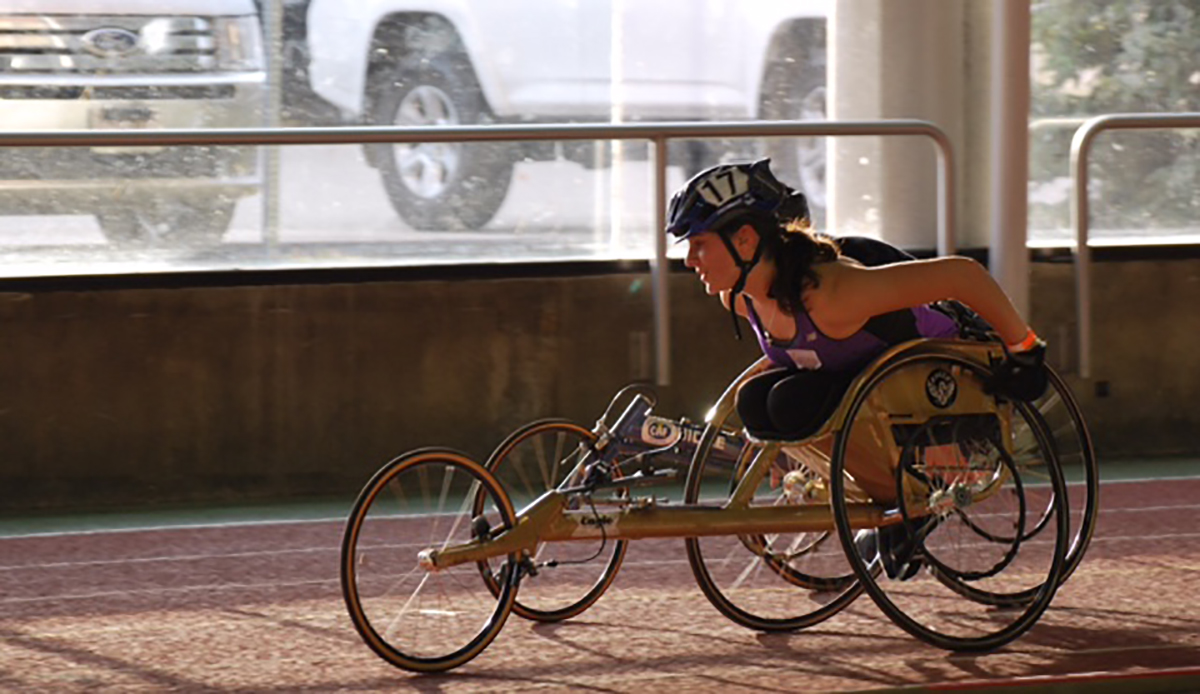Katrina Gerhard’s Marathon Journey Began When She Stopped Walking

Katrina Gerhard, in action. / Photo provided
Katrina Gerhard didn’t consider herself an athlete until she could no longer walk.
In eighth grade, the Acton resident took up the family tradition of folk dancing. She joined a sword-dancing group in Sudbury, practicing with the hope of competing in high school. Then she broke her collarbone.
The fall happened five years ago, during a sword-dancing competition, when she landed on her neck after a failed back flip. Tests showed no damage to Gerhard’s spine, but she still couldn’t walk even as her collarbone healed. Eventually, she was confined to a wheelchair, with no diagnosis to blame.
The mystery hovered over Gerhard until last year, when doctors diagnosed her with the rare neurological disorder demyelinating polyneuropathy. The condition breaks down the myelin sheath, the protective coating around the nerve, progressively diminishing movement in the arms or legs. Gerhard says this revelation changed her perspective on the situation.
“For a long time we thought ‘the accident‘ was to blame, and now we know it actually was more of a symbolic thing, but not the literal cause of what’s going on,” Gerhard says. “Now it’s just a different way to look at it: This was probably going to be anyway, and it might’ve already been happening.”
Even before that diagnosis, Gerhard, who’s now a freshman studying pre-med at the University of Illinois, signed up for Acton-Boxborough’s track team as a sophomore in high school. “[My friends and I] heard that track was a no-cut sport, so we wanted to push the boundaries a little bit,” Gerhard says.
That’s when her road to the Boston Marathon began, even if she didn’t realize it at the time.
She started working out with the team and competing for fun, before finding out that wheelchair racing is a competitive sport. Once that happened, Gerhard, with the help of her teammates, ditched her cumbersome 45-pound wheelchair for a lighter, more mobile chair.
It was around that time that Gerhard was introduced to Joe Walsh, the president of Adaptive Sports New England. Founded in 2013, the organization focuses on increasing sports participation among kids with visual or mobility impairments, and has partnerships with the Massachusetts Interscholastic Athletic Association and the Eastern College Athletic Conference. Gerhard mentored at some of ASNE’s camps, which eased the sting of being unable to compete for points on her high school track team.
“It made me feel less vital to the team,” Gerhard says of that ruling. “I hope that adaptive high school athletes in the future will have more equality in Massachusetts.”
Despite the obstacles she faced, Gerhard began racing more aggressively, and was named a team captain senior year. Last summer, she took part in competitions all over the United States, before finishing off with the annual Falmouth Road Race. She’s currently a member of the University of Illinois wheelchair racing team, and has competed in the Chicago Marathon—finishing in 2:01:08, a time fast enough to qualify for Boston—and the New York City Half-Marathon, all to prepare herself for the Boston Marathon.
Training for a marathon is hard enough for runners, but a wheelchair only complicates the equation. Gerhard says it’s difficult to get out on the roads in Massachusetts, given the lack of open space and the uneven terrain. She’s able to train more easily in Illinois, where she wheels on flat roads between the state’s cornfields for up to 20 miles at a time.
Gerhard says she’s learned to tune out the pain in the midst of a race—which isn’t all that different from the way she’s persevered over the last handful of years.
“If I focus on the pain, or how much longer I have, it gets discouraging,” she says. “I focus on my technique and tell myself to push as hard as I can in that moment, and not focus on anything else. I also try to be mindful of the way the sun and air feel, and what the road and crowds look like. Just enjoy the moment; you get a lot of them in a marathon.”


